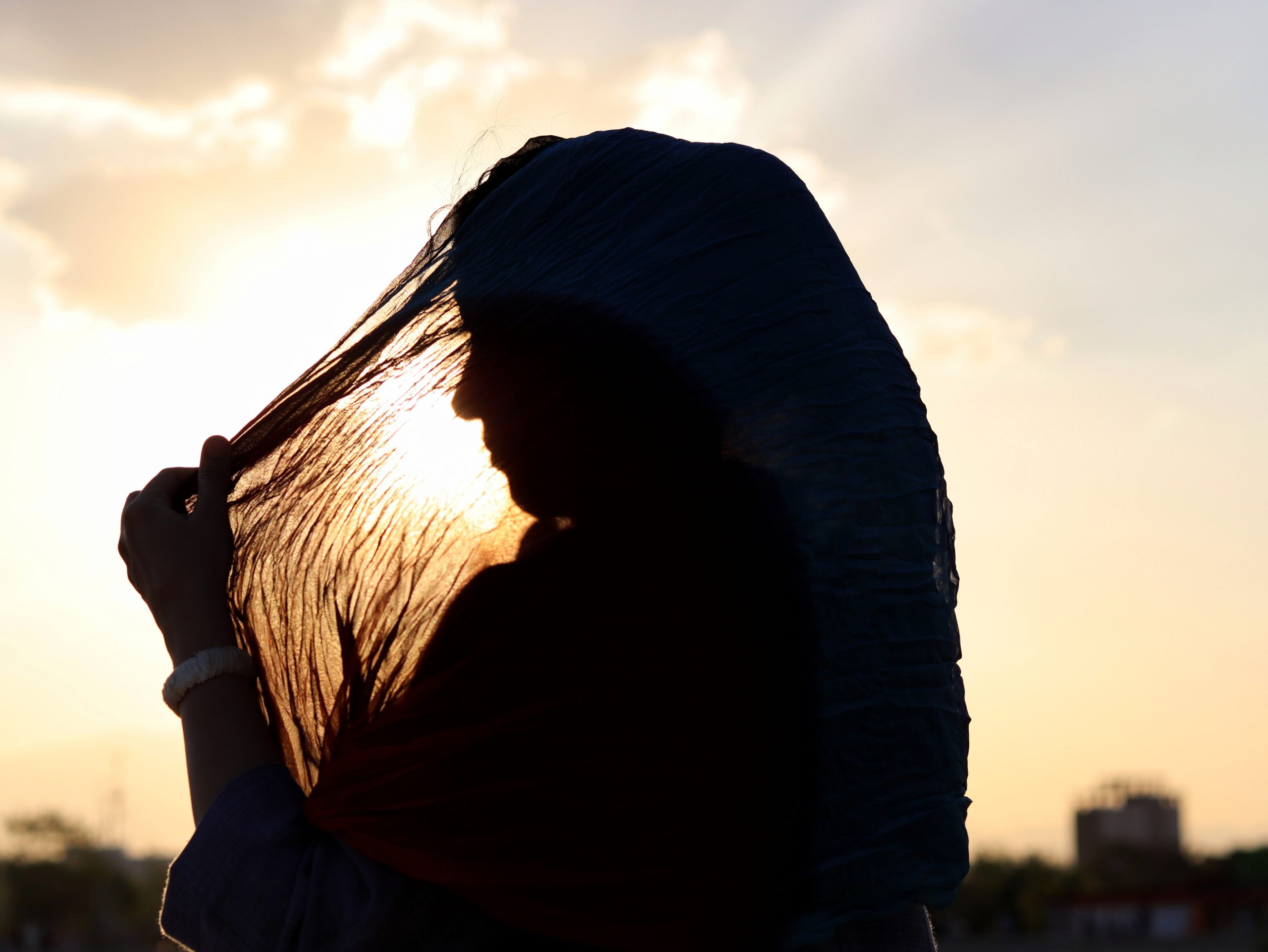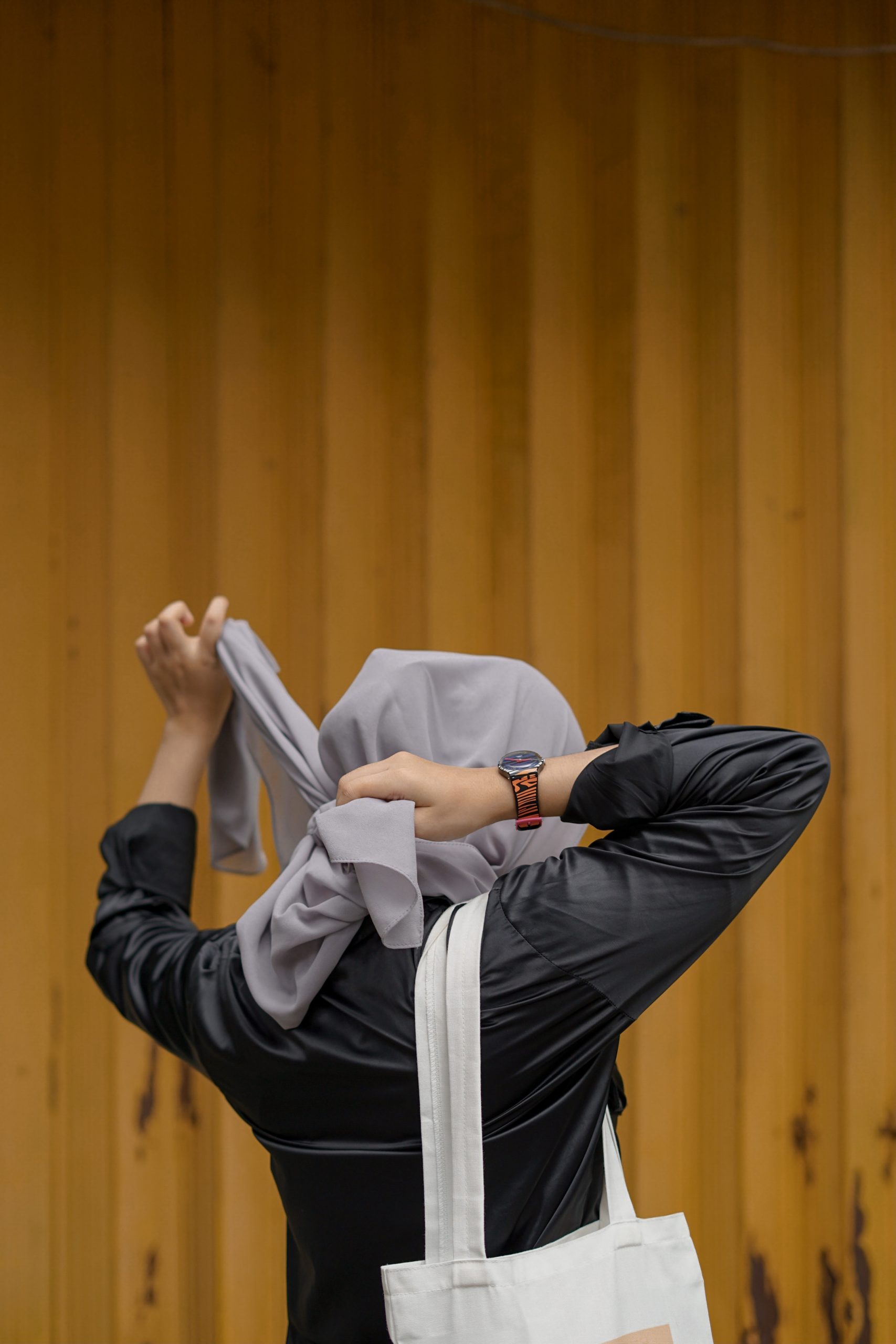#Islam
The Purpose of Hijab: Reclaiming The Narrative
Published

Introduction
14-year old Sarah sobbed uncontrollably, shaking as her mother tried to console her. All her excitement and enthusiasm had vanished, and she wished to return home to Houston. Not even her earnest, lifetime desire to see the Ka’bah for the first time was going to keep her in this modest hotel in Makkah anymore. Why had this happened to her? Why had the meek looking young bellboy groped her? As if to give her an answer, her father came into the room exhausted, furious, and sad. “He’s apologizing. He’s saying he would have never done it, but since she was wearing a western style hijab and was speaking English, he thought she would be fine with it.”
As sad as it was for me to hear my friend narrating this true incident with her daughter, it was even sadder for me when she ‘accepted’ the bellboy’s excuse for acting indecent towards Sarah. Nor was it just her; the entire hotel management defended the boy’s actions, claiming that Western girls in general are not modest, and that had she been wearing a local style hijab, he would have abstained. It was then that I felt the urge to reclaim the narrative regarding the purpose of hijab for girls, and the importance of self-restraint for boys.
“But what was she wearing?”
This incident is not an isolated one. In response to the 118 women killed in acts of domestic and sexual violence in Italy in 2012, Catholic Priest Piero Corsi told women to ask, “Did we bring this on ourselves? What do you feel when you see a naked woman? Is it not a woman’s violence [sic] to unveil herself that way?”. Quoting many statistics from actual incidents, Hutton concludes in her article the horrific reality that “the scapegoat argument blaming women’s attire for sexual violence has been used in court countless times to the detriment of the sexual violence community”1https://www.necessarybehavior.com/blogs/news/but-what-was-she-wearing-the-dangerous-rhetoric-surrounding-clothing-consent. Sadly, it is not just men. Hutton mentions that 54% of women partially blame rape victims for their assault. All across the globe, crossing the barriers of cultures, religions, and social status, men and many women have endorsed victim blaming using the rhetoric of “But what was she wearing?”
Keep supporting MuslimMatters for the sake of Allah
Alhamdulillah, we're at over 850 supporters. Help us get to 900 supporters this month. All it takes is a small gift from a reader like you to keep us going, for just $2 / month.
The Prophet (SAW) has taught us the best of deeds are those that done consistently, even if they are small. Click here to support MuslimMatters with a monthly donation of $2 per month. Set it and collect blessings from Allah (swt) for the khayr you're supporting without thinking about it.

Those with a patriarchal mentality have even used the words of the Prophet ﷺ in their defense, quoting the hadith:
قَالَ رَسُولُ اللَّهِ صَلَّى اللَّهُ عَلَيْهِ وَسَلَّمَ: «مَا تَرَكْتُ بَعْدِي فِتْنَةً أَضَرَّ عَلَى الرِّجَالِ من النِّسَاء
Allah’s Messenger ﷺ said, “I have not left behind me a fitnah (trial) more injurious to men than women.” [Bukhari and Muslim].
This mindset continues to exist in the 21st century when during a live television interview, Imran Khan, the current Prime Minister of the Islamic Republic of Pakistan, a country with conservative religious practices, claimed that “wearing the veil would protect women from sexual assault and not lead men into temptation.4Gannon. Pakistan PM Imran Khan accused of blaming women’s dress for rape. Retrieved 21 December 2021, from https://www.smh.com.au/world/asia/pakistan-pm-imran-khan-accused-of-blaming-wome n-s-dress-for-rape-20210408-p57hhg.html ”
The genuine question that follows is whether there is any truth to the claim that men are unable to control themselves if women dress immodestly. Appalling to some and vindicating to others, science appears to support the claim of a marred perception of women dressed in fewer clothes bringing out the worst instinct in men.
Princeton University Research Findings
In a research study conducted by a group of psychologists at Princeton University, brain scans were taken of men while being shown pictures of women. All else being equal, the only variable was the way women were dressed, whether scantily clad or modestly clothed. Findings of how men’s brains reacted to each kind of picture were recorded and analyzed. The research concluded that sexualized women were more closely associated with being objects, rather than agents of actions, as compared to clothed women5Fiske, Susan t, et al. “From Agents to Objects: Sexist Attitudes and Neural Responses to Sexualized Targets.” Journal of Cognitive Neuroscience, U.S. National Library of Medicine, Mar. 2011, www.ncbi.nlm.nih.gov/pmc/articles/PMC3801174/.. In other words, men’s brains failed to see “the women in bikinis as human beings with thoughts and intentions.6Dell’Amore, Christine. “Bikinis Make Men See Women as Objects, Scans Confirm.” Science, 16 Feb. 2009, www.nationalgeographic.com/science/2009/02/bikinis-women-men-objects-science/.” This seems to substantiate claims that women should cover themselves to reduce temptation for men.
The truth of these assertions must be evaluated in the light of the guidance from the Quran and Sunnah. Does Islam require women to cover themselves in order to stop being a temptation for men? And is hijab mandated so that women will not be harassed? Alhamdulillah, Islam came as a complete system of life, sent by an all knowing, most loving God, guided by a human Prophet ﷺ who not only conveyed, but lived among a society comprising of both men and women, and dealt with social issues as they arose.
Incidents from the Lifetime of the Prophet 
Hadith # 1 – The case of staring:
We see one of these scenarios in the following hadith:
أَرْدَفَ رَسُولُ اللَّهِ صلى الله عليه وسلم الْفَضْلَ بْنَ عَبَّاسٍ يَوْمَ النَّحْرِ خَلْفَهُ عَلَى عَجُزِ رَاحِلَتِهِ، وَكَانَ الْفَضْلُ رَجُلاً وَضِيئًا، فَوَقَفَ النَّبِيُّ صلى الله عليه وسلم لِلنَّاسِ يُفْتِيهِمْ، وَأَقْبَلَتِ امْرَأَةٌ مِنْ خَثْعَمَ وَضِيئَةٌ تَسْتَفْتِي رَسُولَ اللَّهِ صلى الله عليه وسلم فَطَفِقَ الْفَضْلُ يَنْظُرُ إِلَيْهَا، وَأَعْجَبَهُ حُسْنُهَا، فَالْتَفَتَ النَّبِيُّ صلى الله عليه وسلم يَنْظُرُ إِلَيْهَا، فَأَخْلَفَ بِيَدِهِ فَأَخَذَ بِذَقَنِ الْفَضْلِ، فَعَدَلَ وَجْهَهُ عَنِ النَّظَرِ إِلَيْهَا
Al-Fadl bin `Abbas rode behind the Prophet ﷺ as his companion rider on his she-camel on the Day of Nahr, and Al-Fadl was a handsome man. The Prophet ﷺ stopped to give the people verdicts. In the meantime, a beautiful woman from the tribe of Khath’am came, asking the verdict of Allah’s Messenger ﷺ. Al-Fadl started looking at her as her beauty attracted him. The Prophet ﷺ looked behind while Al-Fadl was looking at her; so the Prophet ﷺ held out his hand backwards and caught the chin of Al-Fadl and turned his face (to the sides in order that he should not gaze at her. [Al Bukhari]
This incident indicates that the onus was placed on the man who was looking. The Prophet ﷺ focused on teaching personal responsibility to al-Fadl. There is discussion among the scholars on whether the woman was covering her face or not. Some argue that she was not, and that the Prophet ﷺ did not advise her to cover her face, reiterating that the Prophet ﷺ delegated the responsibility to al-Fadl. Opponents of this interpretation claim that her face was covered and that was why the Prophet ﷺ did not advise her to cover herself; al-Fadl must have been aware of her beauty from before or from other indicators (her hands, etc.). Even if that was the case, hiding her face did not curb al-Fadl’s attraction towards her or deter him from staring at her. In either case, the Prophet ﷺ did not advise her to send a man to inquire about her question, and rather instructed al-Fadl to restrain himself.
Hadith # 2 – The case of rape:
Consider another hadith:
أَنَّ امْرَأَةً، خَرَجَتْ عَلَى عَهْدِ رَسُولِ اللَّهِ صلى الله عليه وسلم تُرِيدُ الصَّلاَةَ فَتَلَقَّاهَا رَجُلٌ فَتَجَلَّلَهَا فَقَضَى حَاجَتَهُ مِنْهَا فَصَاحَتْ فَانْطَلَقَ وَمَرَّ عَلَيْهَا رَجُلٌ فَقَالَتْ إِنَّ ذَاكَ الرَّجُلَ فَعَلَ بِي كَذَا وَكَذَا . وَمَرَّتْ بِعِصَابَةٍ مِنَ الْمُهَاجِرِينَ فَقَالَتْ إِنَّ ذَاكَ الرَّجُلَ فَعَلَ بِي كَذَا وَكَذَا . فَانْطَلَقُوا فَأَخَذُوا الرَّجُلَ الَّذِي ظَنَّتْ أَنَّهُ وَقَعَ عَلَيْهَا وَأَتَوْهَا فَقَالَتْ نَعَمْ هُوَ هَذَا . فَأَتَوْا بِهِ رَسُولَ اللَّهِ صلى الله عليه وسلم فَلَمَّا أَمَرَ بِهِ لِيُرْجَمَ قَامَ صَاحِبُهَا الَّذِي وَقَعَ عَلَيْهَا فَقَالَ يَا رَسُولَ اللَّهِ أَنَا صَاحِبُهَا . فَقَالَ لَهَا ” اذْهَبِي فَقَدْ غَفَرَ اللَّهُ لَكِ ” . وَقَالَ لِلرَّجُلِ قَوْلاً حَسَنًا وَقَالَ لِلرَّجُلِ الَّذِي وَقَعَ عَلَيْهَا ” ارْجُمُوهُ ” . وَقَالَ ” لَقَدْ تَابَ تَوْبَةً لَوْ تَابَهَا أَهْلُ الْمَدِينَةِ لَقُبِلَ مِنْهُمْ ”
“A women went out during the time of the Prophet ﷺ to go to Salat, but she was caught by a man and he had relations with her, so she screamed and he left. Then a man came across her and she said: ‘That man has done this and that to me’, then she came across a group of Emigrants and she said: ‘That man did this and that to me.’
They went to get the man she thought had relations with her, and they brought him to her. She said: ‘Yes, that’s him.’ So they brought him to the Messenger of Allah ﷺ, and when he ordered that he be stoned, the man who had relations with her, said: ‘O Messenger of Allah, I am the one who had relations with her.’ So he said to her: ‘Go, for Allah has forgiven you.’
Then he said some nice words to the man (who was first brought). And he said to the man who had relations with her: ‘Stone him.’ Then he said: ‘He has repented a repentance that, if the inhabitants of Al-Madinah had repented with, it would have been accepted from them.'” [Al Tirmidhi].
The Prophet ﷺ did not make her attire a point of contention in the verdict. Even if it is assumed that the woman was properly and modestly dressed, it only supports the conclusion that this paper arrives at: women’s attire is irrelevant to the harassment they endure.
Hadith # 3 – The case of proximity:
In another narration:
كَانَتِ امْرَأَةٌ تُصَلِّي خَلْفَ رَسُولِ اللَّهِ صلى الله عليه وسلم – حَسْنَاءُ مِنْ أَحْسَنِ النَّاسِ فَكَانَ بَعْضُ الْقَوْمِ يَتَقَدَّمُ حَتَّى يَكُونَ فِي الصَّفِّ الأَوَّلِ لِئَلاَّ يَرَاهَا وَيَسْتَأْخِرُ بَعْضُهُمْ حَتَّى يَكُونَ فِي الصَّفِّ الْمُؤَخَّرِ فَإِذَا رَكَعَ نَظَرَ مِنْ تَحْتِ إِبْطَيْهِ فَأَنْزَلَ اللَّهُ : ( وَلَقَدْ عَلِمْنَا الْمُسْتَقْدِمِينَ مِنْكُمْ وَلَقَدْ عَلِمْنَا الْمُسْتَأْخِرِينَ )
There was a woman who performed Salat behind the Messenger of Allah ﷺ , and she was the most beautiful among the people. Some of the people would go forward to the first line so as not to see her. Others would go back to the last line so when he would bow, he could look at her from under his armpit. So Allah revealed: “Indeed We know those who try to come forward among you, and We know those who try to go back.” (Quran 15:24) [Al Tirmidhi]
The responsibility of men’s actions is delegated back to them. Some scholars say that as a result of this situation, the Prophet ﷺ said,
قال رسول الله صلى الله عليه وسلم: “خير صفوف الرجال أولها، وشرها آخرها، وخير صفوف النساء آخرها، وشرها أولها
“The best of the men’s rows is the first row and the worst is the last; but the best of the woman’s row is the last and the worst of their rows is the first.” [Muslim]
The Prophet ﷺ advised both men and women regarding the rows that were better for them in order to maintain a distance between them. This illustrates the Islamic dictum to both men and women to take necessary actions in order to maintain modesty and avoid any lustful thoughts or impulses.
Two conclusions can safely be drawn from the ahadith mentioned above: firstly, that the Prophet ﷺ held men solely responsible for their actions, and secondly, that women’s clothes were irrelevant to their experience with men.
Social Experiments Conclude that Attire is Irrelevant in Harassment:
Many social experiments have been conducted to demonstrate that what women wear is inconsequential in provoking men against them. For the sake of brevity, only two surveys will be mentioned here: first, by Katie Heng on Tumblr showcasing what women were wearing when they were catcalled, concluding, “What she was wearing doesn’t matter. Period.7Essert, Matt. “‘But What Was She Wearing?”: A Powerful Tumblr Destroys the Big Myth About Catcalling.” Mic, Mic, 9 Nov. 2014, www.mic.com/articles/103840/but-what-was-she-wearing-tumblr-proves-any-outfit-can-be-a-target-for-catcalling.” The second from across the globe, a survey conducted of 2000 Muslim women which revealed a disheartening 43% wore a proper Islamic attire – burqa, niqab, khimar, hijab – when they were harassed. ‘Attire provokes rapists and rape happens because of what she was wearing’ is a myth that has been thoroughly debunked8Rouf, Ishrat Binte, and Ishrat Binte Rouf. “What Was She Wearing?” The Business Standard, 15 Oct. 2020, tbsnews.net/thoughts/what-was-she-wearing-145381.. Though no official data has been collected and published, multiple accounts of harassment are related by Muslim women in full hijab during tawaf in the holiest site on this planet, in front of the blessed House of Allah 
Is the Purpose of Hijab to Protect Women?
However, before definitively concluding a no correlation between hijab and harassment, as Muslims, the most truthful words of Allah 
“OProphet, tell your wives and your daughters and the women of the believers to bring down over themselves [part] of their outer garments. That is more suitable that they will be known and not be abused. And ever is Allah Forgiving and Merciful.” [Surah Al-‘Ahzab:59]

Therefore, if the purpose of hijab is to not be assaulted, then hijab would become obsolete with the first incident of an attack on a modestly dressed woman. Besides, norms change with time and many women in our times are harassed because they are dressed as Muslims9Qadhi, Yasir. “Perfect Justice: Debunking The Male Bias Myth – Yasir Qadhi.” YouTube, YouTube, 2 Apr. 2008, www.youtube.com/watch?v=3Mz8nTTS27g..
If the purpose of hijab is to keep men from falling into fitnah, then what about men who find a woman who is dressed modestly to be exotic and more attractive10Qadhi, Yasir. “Perfect Justice: Debunking The Male Bias Myth – Yasir Qadhi.” YouTube, YouTube, 2 Apr. 2008, www.youtube.com/watch?v=3Mz8nTTS27g.? Also, we are displacing responsibility for men’s misdeeds in this case. The message being sent is that wearing hijab is a way to protect Muslim men by helping them focus on their religion instead of on hers.
Allah 
“Say, “Is it other than Allah I should desire as a lord while He is the Lord of all things? And every soul earns not [blame] except against itself, and no bearer of burdens will bear the burden of another. Then to your Lord is your return, and He will inform you concerning that over which you used to differ.”[Surah Al ‘An’am:164]
Though Allah’s 
Besides, correlation does not equal causation.
Allah 

“Recite, [O Muhammad], what has been revealed to you of the Book and establish prayer. Indeed, prayer prohibits immorality and wrongdoing, and the remembrance of Allah is greater. And Allah knows that which you do.” [Surah Al-‘Ankabut:45]
For many Muslims sadly, their prayers do not prohibit them from immorality and wrongdoing. The words of Allah 


The idea of defining hijab in relationship to harassment doesn’t hold much ground. All claims (secular and religious, feminist, and orthodox) that hijab protects women from assault have been proven false many times.
The first and foremost cause, the purpose of hijab is an obedience to Allah 


Similar to many other acts of worship and commands from Allah 

Women are a Fitnah for Men
Going back to the truthful words of the Prophet ﷺ,
قَالَ رَسُولُ اللَّهِ صَلَّى اللَّهُ عَلَيْهِ وَسَلَّمَ: «مَا تَرَكْتُ بَعْدِي فِتْنَةً أَضَرَّ عَلَى الرِّجَالِ من النِّسَاء
“I have not left behind me a fitnah (trial) more injurious to men than women.” [Bukhari and Muslim]
There is no doubt in this hadith as it is of the highest level of authenticity. The word fitnah comes from the root fatana, which means ‘to separate.’ In Arabic, the fire of a goldsmith is called fatan as it separates pure gold from its impurities11Wehr, Hans, and J. Milton. Cowan. A Dictionary of Modern Written Arabic. Snowball Publishing, 2001.. A test and a trial is an opportunity in Islam to prove one’s sincerity and effort to Allah 



“And know that your properties and your children are but a trial and that Allah has with Him a great reward.” [Surah Al-‘Anfal:28 and Surah Taghabun:15]
Both times, the fitnah is followed up with a promise of a great reward from Allah 
Further, the mention of the word fitnah about something does not make it inherently evil. Allah 

So they said, “Upon Allah do we rely. Our Lord, make us not [objects of] trial for the wrongdoing people. [Surah Yunus:85]
Allah 
“Beautified for people is the love of that which they desire – of women and sons, heaped-up sums of gold and silver, fine branded horses, and cattle and tilled land. That is the enjoyment of worldly life, but Allah has with Him the best return.” [Surah ‘Ali ‘Imran:14]
The lust that men have for women is placed at the top of this list by Allah 

This identifies a response in human brains on seeing a woman in fewer clothes. Compare this to alcohol consumption. Multiple studies have shown the brain’s response slows when intoxicated. Their impaired judgment is not excused based on the fact that alcohol does impair their judgment. Similarly, equipped with the knowledge that staring at immodestly dressed women provokes them, men should adhere firmly to the sunnah of the Prophet ﷺ, by turning their faces away and lowering their gazes.
Conclusion
It is evident from researching various incidents from the lifetime of the Prophet 

Beyond the statement that it makes, hijab is an act of worship to Allah 

Works cited:
Cikara, Mina, et al. “From Agents to Objects: Sexist Attitudes and Neural Responses to Sexualized Targets.” Journal of Cognitive Neuroscience, U.S. National Library of Medicine, Mar. 2010, www.ncbi.nlm.nih.gov/pmc/articles/PMC3801174/.
Medina, Jameelah. “This Battlefield Called My Body: Warring over the Muslim Female.” Religions, vol. 5, no. 3, 2014, pp. 876–885., doi:10.3390/rel5030876.
Related reading:
– Hijab And Jilbab In the Quran: On The Hermeneutics Of The Quranic Verse Of Khimar
– Is Discussing Hijab Off Limits? Overcoming Sexualizing Muslim Women
Keep supporting MuslimMatters for the sake of Allah
Alhamdulillah, we're at over 850 supporters. Help us get to 900 supporters this month. All it takes is a small gift from a reader like you to keep us going, for just $2 / month.
The Prophet (SAW) has taught us the best of deeds are those that done consistently, even if they are small. Click here to support MuslimMatters with a monthly donation of $2 per month. Set it and collect blessings from Allah (swt) for the khayr you're supporting without thinking about it.
Sadaf Syed (Um Talhah) is an American Muslim woman, a writer, speaker, teacher, mosque tour guide, Hajj & Umrah guide, motivational speaker but most importantly mama to 4 amazing muslim youths. She has spent the last 30 years in learning and teaching both in the US and overseas specializing in helping people connect back to the basics of Islam, especially their relationship with Allah. She has certification in teaching Tajweed and Arabic grammar from Markaz Asma bint Abi Bakr in Saudi, and an Ijazah in the Asharah Qira’aat from Sh Uthman khan and she is currently working on her degree in Islamic studies from Mishkah university.


Faith, Identity, And Resistance Among Black Muslim Students

Moonshot [Part 12] – November Evans

From The Prophets To Karbala: The Timeless Lessons Of Ashura For Muslims Today

Moonshot [Part 11] – The Fig Factory

Nationalism And Its Kurdish Discontents [Part II of II]: Kurds And Turkiye After Ottoman Rule

Moonshot [Part 11] – The Fig Factory

Moonshot [Part 12] – November Evans

Moonshot [Part 10] – The Marco Polo

Moonshot [Part 9] – A Religion For Real Life

Nationalism And Its Kurdish Discontents [Part II of II]: Kurds And Turkiye After Ottoman Rule

[Dhul Hijjah Series] Calling Upon the Divine: The Art of Du’a (Part 1)

IOK Ramadan 2025: Four Steps | Sh Zaid Khan

IOK Ramadan 2025: Do Your Best | Sh Zaid Khan

IOK Ramadan 2025: Giving Preference to Others | Sh Zaid Khan

IOK Ramadan 2025: Which Group Are We In? | Sh Zaid Khan
MuslimMatters NewsLetter in Your Inbox
Sign up below to get started









Ali
March 13, 2022 at 12:02 PM
A well researched article but the truth from a male perspective based on personal experience in the middle east where there is a representative sample of both modestly and indecency attired women especially in the UAE is that when women dress modestly, whatever impulse the man feels in term of sexual attraction is transformed to an expression and appreciation of beauty in a platonic/sisterly sense, whereas when a woman is attired provocatively, the transformation of thoughts and feelings remain in the carnal state of affairs.
NS
March 29, 2023 at 7:07 PM
This is an amazing, well researched article that everyone needs to read! Jazakilahu khairan for helping strengthen our eman and clear up doubts and misconceptions. May Allah help you continue to inspire and create even more beneficial material.
Faatimah Bojang
April 26, 2025 at 11:41 AM
I love this woman Masha Allah May Allah bless and protect you always for standing for Islam. I want to be like her 🥰